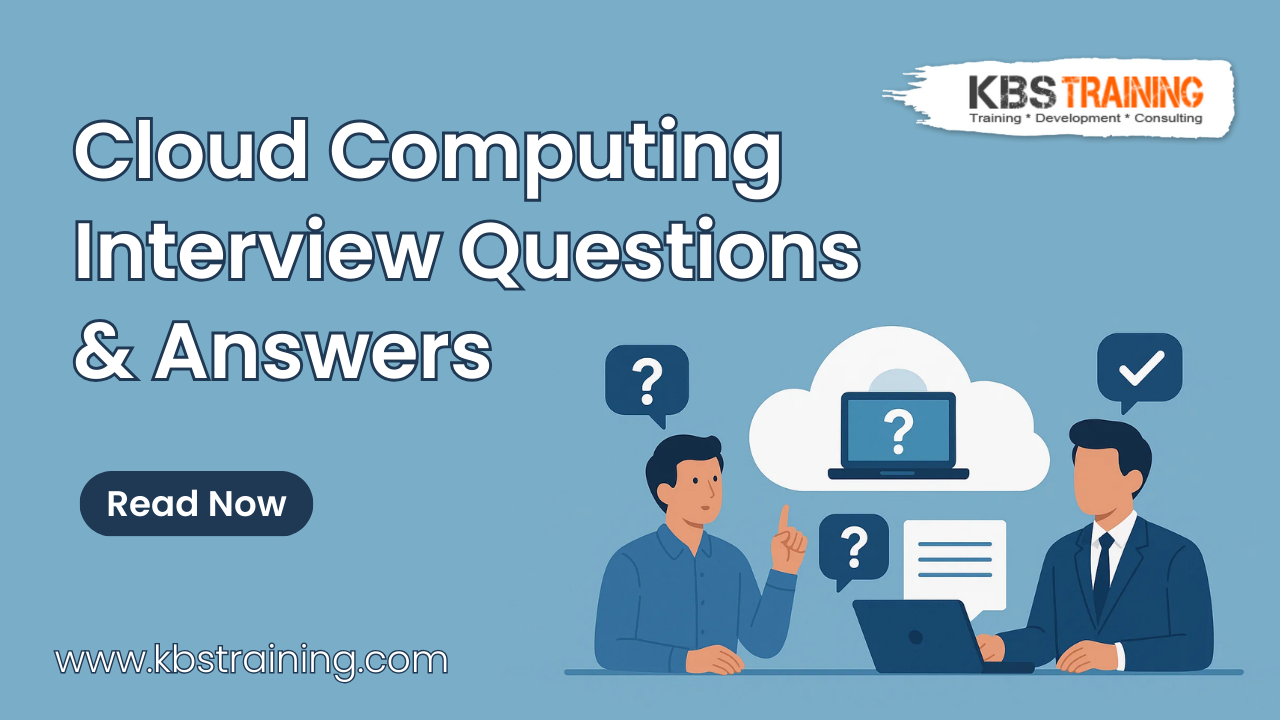Nailing a cloud computing interview takes more than just bookish knowledge—you need real-world insight. Whether you’re aiming for a role in AWS, Azure, or GCP, this guide breaks down the most asked cloud computing interview questions and how to answer them confidently.
1. What is Cloud Computing and Why Is It Important?
Cloud computing is the delivery of computing resources (like servers, databases, networking, storage) over the internet on-demand and on a pay-as-you-go basis.
Benefits include:
-
Scalability (resources scale with demand)
-
Cost-efficiency (no upfront infrastructure)
-
Flexibility (deploy solutions globally in minutes)
Example: A startup can scale during a viral campaign without buying physical servers—just pay for what you use.
2. What Are the Types of Cloud Deployment Models?
There are four major models:
-
Public Cloud: Managed by providers (e.g., AWS, Azure); cost-effective and scalable.
-
Private Cloud: Dedicated to a single organization; better control and security.
-
Hybrid Cloud: Combines both; balance of security and cost.
-
Multi-cloud: Uses services from multiple providers; avoids vendor lock-in.
3. IaaS vs. PaaS vs. SaaS – What’s the Difference?
-
IaaS (Infrastructure as a Service): Like AWS EC2; full control over virtual machines.
-
PaaS (Platform as a Service): Like Google App Engine; focus on app development without managing infrastructure.
-
SaaS (Software as a Service): Like Gmail or Salesforce; fully managed software.
Each has a different level of control and responsibility.
4. What Is the Shared Responsibility Model?
This model defines what the cloud provider secures (e.g., infrastructure) vs. what the user secures (e.g., data, configurations).
-
In IaaS, more responsibility lies with the user.
-
In SaaS, most of the security is the provider’s job.
Example: You must secure your AWS S3 buckets, even though AWS manages the server they’re stored on.
5. How Is High Availability Achieved in the Cloud?
High availability comes from:
-
Redundancy across regions
-
Load balancing to handle traffic
-
Automatic failovers
Example: An e-commerce site on AWS might use Elastic Load Balancer and multi-AZ deployment to prevent downtime.
6. What Are Cloud Security Best Practices?
-
Encrypt data at rest and in transit (TLS, AES-256)
-
Use IAM roles and policies
-
Enable Multi-Factor Authentication
-
Perform regular audits (AWS CloudTrail, Azure Monitor)
Tip: Never leave storage buckets publicly accessible unless required.
7. What Is Serverless Computing?
It allows developers to run code without provisioning or managing servers.
Examples: AWS Lambda, Azure Functions
You’re charged per execution, and the provider handles scaling and availability.
8. How Do You Migrate On-Premises Apps to the Cloud?
Steps:
-
Assess app dependencies
-
Choose a migration strategy:
-
Rehost (lift-and-shift)
-
Refactor (modify for cloud)
-
Rebuild (cloud-native)
-
-
Use tools like AWS Migration Hub
Test in a staging environment before going live.
9. How Do Containers Fit Into Cloud Computing?
Containers (e.g., Docker, Kubernetes) package apps and dependencies together for consistent performance across environments.
They:
-
Improve scalability
-
Work well with microservices
-
Run efficiently in cloud-native systems
10. How Can You Optimize Cloud Costs?
-
Right-size your instances
-
Use auto-scaling and spot/reserved instances
-
Monitor usage with cost tools (e.g., AWS Cost Explorer)
-
Shut down idle resources
Pro Tip: Consider serverless for irregular workloads.
11. What Are Common Challenges in Cloud Adoption?
-
Security concerns
-
Compliance (e.g., GDPR, HIPAA)
-
Vendor lock-in
-
Legacy system integration
-
Upskilling your team
It’s not always smooth sailing—but proper planning helps.
12. How Do You Troubleshoot a Cloud Outage?
-
Check logs (CloudWatch, Azure Monitor)
-
Review deployment or config changes
-
Inspect network settings
-
Test individual components
Example: If a GCP app goes down, start by checking Compute Engine logs and roll back any recent updates.
FAQs
Q: Do these questions apply to all cloud providers?
Yes. The fundamentals (like IaaS vs PaaS, migration, high availability) are applicable across AWS, Azure, and GCP.
Q: Should I memorize these answers?
Nope. Understand the concepts and customize your answers with personal experience.
Q: Are container and serverless technologies important for interviews?
Absolutely! Modern systems rely heavily on Docker, Kubernetes, and Lambda/Functions. Be familiar.
Final Thoughts
These cloud computing interview questions aren’t just for landing a job—they’re for building the mindset of a cloud-native professional. Make sure to supplement this with hands-on labs and real project experience using AWS, Azure, or GCP.
Want to Learn More?
Ready to level up your cloud career?
Consult Us Form: Click Here
Contact Us : WhatsApp
Register now for a FREE consultation to take your career to the next level
For Mail: Click Here | For More Info : Click Here

